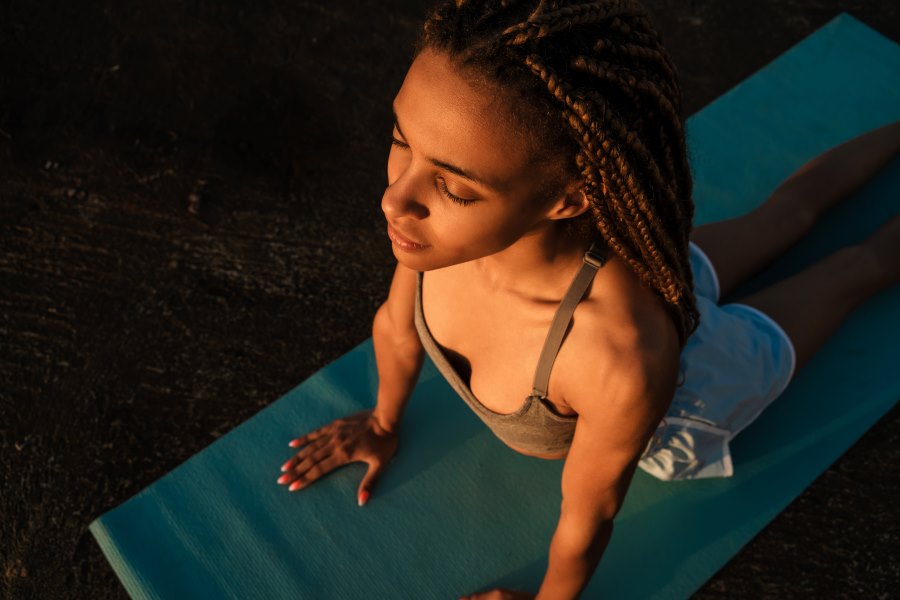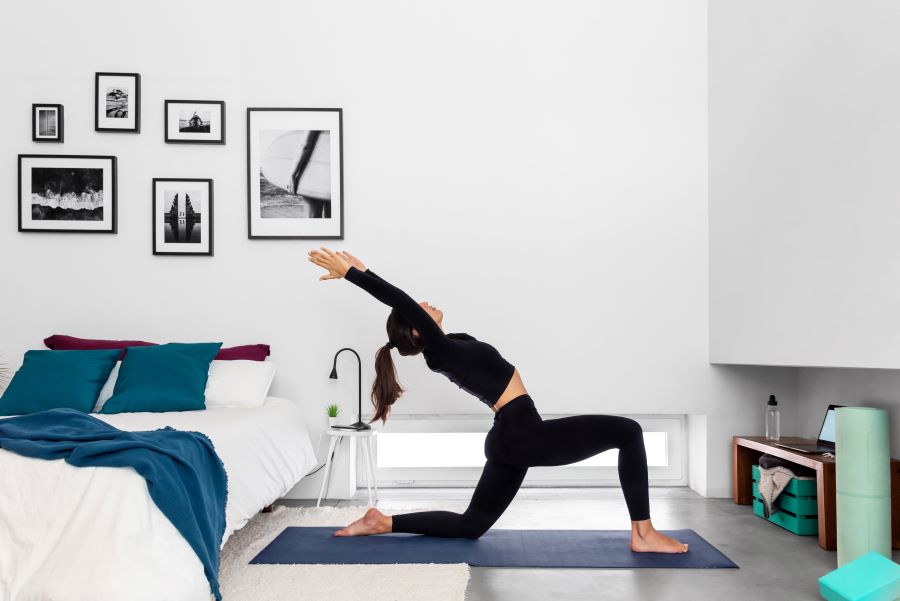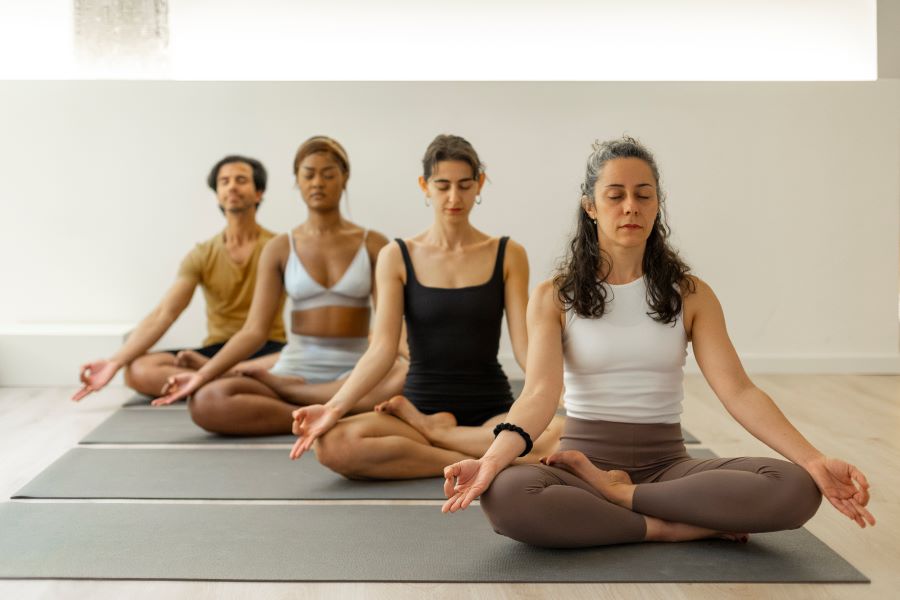What is Dinacharya in Ayurveda & Its Importance

To live a healthy life, it is important to incorporate good lifestyle habits. Many people who are looking for guidance on taking care of their own bodies turn to alternative medicines like Ayurveda, which promotes holistic well-being. Dinacharya in Ayurveda focuses on self-care through the daily activities of our lives. It aims to build our connection to the rhythms of our internal clock.
This holistic approach nurtures a harmonious connection between body, mind, and nature. Read on to know important concepts related to this Ayurvedic concept.

Table of Contents

What is Dinacharya in Ayurveda?
Living in an ever-changing world has its challenges. People tend to become disconnected from nature. However, Ayurveda stresses the importance of the interconnectedness of man and nature. Dinacharya in Ayurveda refers to the daily activities people need to perform to stay healthy. It is a Sanskrit word that literally translates to ‘activities of the day.’
Our daily activities play an important role in our long-term health. In fact, every activity and decision done in a day affects our mental and physical well-being. It is quite easy to lead a life devoid of routine. However, by inculcating awareness, discipline, and dedication into the daily routine and strictly adhering to it, one can lead a purposeful and prosperous life.
If performed regularly, the daily routines of Dinacharya will help a person lead a disciplined life. Furthermore, it promotes an individual’s optimal wellness through routine, nourishment, and detoxification.
Importance of Dinacharya in Ayurveda
Dinacharya, or daily routine in Ayurveda, is crucial for aligning one’s life with natural cycles, promoting holistic well-being. By following Dinacharya, individuals can enhance their health through consistent routines that balance the body's doshas: Vata, Pitta, and Kapha. It supports disease prevention, boosts immunity, and improves digestion.
Regular meditation, yoga, and self-care help alleviate stress and regulate metabolism. Embracing Dinacharya fosters a disciplined lifestyle, enhancing overall vitality and longevity. This daily routine cultivates harmony between the body, mind, and environment.
What are the Daily Cycles of Dinacharya?
The daily cycles of Dinacharya in Ayurveda are aligned with natural rhythms and help maintain balance in the body and mind. These cycles, governed by the sun and moon, dictate the optimal times for various activities to promote overall health and well-being. Dinacharya in Ayurveda enumerates two daily cycles. They are as follows:
1. Sun Cycle or First Cycle
The Sun Cycle, also known as the solar cycle, corresponds to the day and governs activities that require energy and focus. This cycle is from sunrise to sunset, i.e., 6 AM to 6 PM, and is associated with the Pitta dosha, representing transformation, digestion, and metabolism.
During the Sun Cycle, the body’s digestive fire (Agni) is strongest, making it an ideal time for physical activities, eating the main meal, and performing tasks that require mental clarity. The Sun Cycle encourages productivity, vitality, and active engagement with the external world.
2. Moon Cycle or Second Cycle
The Moon or lunar cycle corresponds to the evening and night and governs rest, relaxation, and introspection. This cycle is from sunset to sunrise, i.e., 6 PM to 6 AM, and is linked with the Kapha and Vata doshas, promoting nourishment, healing, and mental calmness.
During the Moon Cycle, the body winds down, making it an ideal time for light meals, gentle activities, and sleep preparation. The Moon Cycle encourages rejuvenation, emotional balance, and connection with the inner self.
During these cycles, Vatta dosha, Pitta dosha, and Kapha dosha are present in an individual’s body in different combinations and intensities. According to the tenets of Ayurveda, one must not engage in any activity that aggravates the cycle of these three energies.
Below are more details of these daily cycles:
List of Yoga for Dinacharya Ayurveda
Dinacharya, or daily routine in Ayurveda, emphasises maintaining balance and health through a structured daily schedule. Yoga can be key in supporting this routine, enhancing physical, mental, and spiritual well-being. Here’s a list of yoga practices that align well with the principles of dinacharya:
1. Surya Namaskar (Sun Salutation)

A sequence of poses that energises and warms up the body. It promotes flexibility, improves circulation, and sets a positive tone for the day.
Benefits:
- Below are a few benefits of the Surya Namaskar:
- Increases overall flexibility and strength.
- Improves circulation and cardiovascular health.
- Energises and warms up the body.
- Enhances mental focus and concentration.
- Promotes better digestion and detoxification.
- Prepares the mind and body for the day ahead.
How to Perform:
- Step 1: Stand with feet together, arms at your sides. Take a deep breath and raise your arms overhead, joining your palms in a prayer position.
- Step 2: As you inhale, stretch your arms up and arch your back slightly. Look up towards your hands, keeping your feet grounded.
- Step 3: Exhale and bend forward at the hips, bringing your hands down to touch the floor or shins. Keep your knees slightly bent if necessary.
- Step 4: Step one foot back into a lunge position. Lower your hips, keeping your front knee bent and your back leg extended. Look up.
- Step 5: Step your other foot back to come into a plank position. Your body should form a straight line from head to heels. Hold briefly.
- Step 6: Exhale and bring your body back into the downward-facing dog position, then step or jump back to the starting position. Repeat the sequence as desired.
2. Chandrasana (Half Moon Pose)

Chandrasana, or Half Moon Pose, is a balancing yoga posture that strengthens the legs, opens the hips, and improves overall stability.
Benefits:
- Below are a few benefits of the Chandrasana :
- Strengthening core muscles.
- Improves Body Balance.
- Strengthens your legs.
- Enhances flexibility of the spine.
- Good body stretch.
- Cellular regeneration.
- Improve concentration, focus, and determination.
- Eases constipation.
How to Perform:
To perform Chandrasana, follow these steps:
- Step 1: Start by standing in a wide-legged stance with your feet about hip-width apart. Extend one leg to the side and place the same-side hand on your hip.
- Step 2: Bend at the waist to reach the opposite hand towards the floor or a block while lifting the opposite leg to hip height, keeping your body in a straight line.
- Step 3: Balance by focusing on your gaze and engaging your core. Hold the position for several breaths, then return to standing and repeat on the other side.
3. Kapalabhati (Skull Shining Breath)

A vigorous breathing exercise clears the mind and energises the body. It stimulates the digestive system and promotes mental alertness. Excellent for invigorating the start of the day.
Benefits:
Below are a few benefits of the Kapalbhati:
- Clears the mind and improves mental alertness.
- Stimulates the digestive system and increases metabolism.
- Energises and revitalises the body.
- Strengthens the respiratory system and lungs.
- Detoxifies the body by eliminating carbon dioxide.
- Helps to relieve stress and anxiety.
How to Perform:
To perform Kapalbhati, follow these steps:
- Step 1: Sit in a comfortable cross-legged position with your spine straight.
- Step 2: Place your hands on your knees with palms facing up.
- Step 3: Take a deep breath through your nose.
- Step 4: Exhale forcefully and quickly through your nose, drawing your belly in sharply.
- Step 5: Continue with rapid, forceful exhalations and passive inhalations for 20–30 breaths.
- Step 6: After completing the round, take a deep breath in and exhale slowly. Rest before starting the next round.
Integrating these practices into your daily routine can help you maintain balance, increase energy, and support overall health. It’s important to listen to your body and adjust practices to fit your needs and lifestyle.
How to Maintain Dinacharya Routine?
Maintaining a healthy Dinacharya routine is essential for overall well-being. Given below are all the steps of following the daily routine as per Dinacharya:
Step 1: Wake Up Early
According to Dinacharya practices, one needs to wake up at Brahma muhurta. Experts consider the ideal time to be between 4:30 AM and 5 AM. The Vatta dosha is most dominant in an individual during the pre-dawn time, and its environmental energy enables a person to wake up easily.
This particular time of the day also lends fresh energy to one’s body and soul. Awakening early helps set a positive tone for the day. It's also a time when the mind is most serene. Waking up early supports overall well-being.
Step 2: Rinse Your Face
One should rinse his/her face properly after waking up and then perform Jalneti. It is an Ayurvedic technique of cleaning the mouth, sinus, and nasal passage with a neti pot, a tea pot-like vessel.
This practice clears out accumulated toxins, refreshes your senses, and prepares you for the day. Clean your face overnight to remove impurities. Jalneti is key for maintaining nasal health.
Step 3: Drink Warm Water
Ayurvedic practitioners recommend drinking warm water in the morning. Most people these days drink tea or coffee the first thing in the morning. However, if one consumes warm water instead, it helps detoxify. Furthermore, it prevents chronic conditions in one’s digestive system.
Avoid tea or coffee immediately, as warm water is gentler on the stomach. It aids in preventing chronic digestive conditions, flushes out toxins, and prepares your digestive system for the day.
Step 4: Maintenance of Hygiene
One can use rose water or Triphala for cleaning eyes. An individual can gargle with water, brush his/her teeth properly and clean his tongue to activate taste buds. Ayurveda recommends performing Oil Pulling with sesame or coconut oil to remove toxins and bacteria from the mouth.
Perform Oil Pulling with sesame or coconut oil to remove toxins and bacteria from the mouth. This routine activates your taste buds. Proper hygiene boosts the body's oral health and overall well-being.
Step 5: Oil Massage
Abhyanga, or a full body oil massage with prescribed oils, is essential for self-care. Ayurveda recommends oil massages before taking a bath because it nourishes the body and improves blood circulation. This enables one’s nervous system to become calm and healthy.
Perform Abhyanga, a full-body oil massage, with prescribed oils before bathing. This practice nourishes your body and enhances blood circulation. It calms your nervous system and supports overall health.
Step 6: Exercise and Bathe
Dinacharya in Ayurveda recommends exercising regularly as it strengthens one’s body, removes fat, and improves capacity for work. People should try to fit any exercise regime into their daily routine, whether yoga or jogging.
Bathing is an integral part of the Dinacharya routine. It removes excess oil from the surface of one’s skin. It provides fresh energy to an individual for performing the day’s tasks. Bathing provides a fresh start for the day's tasks. Regular exercise and bathing contribute to vitality.
Step 7: Pray and Meditate
Praying and meditating enables an individual to concentrate on his duty and goals. It enables a person to feel peaceful and steady and better focus on his goals. Meditation also helps in calming one’s nervous system.
This practice brings peace and helps improve concentration. Meditation calms the nervous system and stabilises your mind. It enhances your mental clarity and emotional well-being. Spending time in contemplation supports overall balance.
Step 8: Have a Hearty Breakfast
One should have a nutritious breakfast. It is not advisable to eat a large portion. But the food taken should enable one to go on working till lunch without snacking on unhealthy food. The quantity and type of food may vary depending on an individual's body type.
Avoid overeating; instead, choose foods that keep you full and energetic. Tailor your breakfast to suit your body type. A balanced meal provides necessary nutrients. By ensuring a satisfying breakfast, you can avoid snacking on unhealthy foods.
Step 9: Lunch
The ideal time to partake in lunch is between noon and 1pm. This is when Pitta dosha, responsible for digestion, is dominant in an individual’s body. This balance aids digestion. After lunch, a short walk can help with food digestion. Proper timing and balance support health.
According to Ayurveda, the ideal lunch comprises every taste, including tikta (bitter), lavana (salty), katuka (pungent), amla (acidic), kashaya (astringent), madhura (sweet). To facilitate proper digestion of the food, it is advised to go for a walk after lunch.
Step 10: Don’t Sleep After Lunch
One can take a short nap after lunch as it keeps one fresh and alert. However, one must not fall asleep after lunch as it accumulates vitiated Kapha. After a short nap, a person can continue his or her work till dinner.
A short nap is acceptable but should not extend into full sleep. Continue working or engaging in activities post-lunch. Avoiding prolonged post-lunch sleep supports digestion and keeps you alert. Short naps can refresh you without disrupting your balance.
Step 11: Give Yourself Time After Sunset
After completing the day’s work, one should devote time to oneself. In many cultures across the world, people need to pray and meditate after sunset. Dedicate time to yourself after sunset to unwind from the day’s activities.
Many cultures incorporate prayer or meditation during this period. This time is ideal for reflection and relaxation. Evening routines help transition into a calm and peaceful state. This practice supports emotional and mental balance.
Step 12: Have a Light Dinner
Ideally, dinner should be lighter than lunch. Experts worldwide advise people to have dinner 2 – 3 hours before sleep. It helps in the proper digestion of the food. Additionally, if one goes to bed immediately after dinner, it might result in digestive problems.
According to Ayurveda, walking for some time after dinner is beneficial. Eating too close to bedtime can cause digestive issues. A light dinner allows your body to rest and digest properly. A brief walk after dinner can aid digestion and relaxation.
Step 13: Sleep Early
Massaging the head and feet with oil before sleeping is a good idea. This practice calms the body's systems and improves general well-being. Moreover, Ayurveda recommends drinking Triphala before sleeping to facilitate digestion and improve eye health.
It also helps one to avoid problems related to constipation. Drinking Triphala before bed aids digestion and supports eye health. It helps avoid constipation and ensures restful sleep. A consistent sleep routine enhances overall health.
What are the Benefits of Dinacharya?

By following a consistent daily routine aligned with nature's rhythms, Dinacharya promotes balance, vitality, and overall harmony in life. Given below are the benefits of a daily routine of Dinacharya in Ayurveda:
This blog has enumerated crucial details regarding Dinacharya in Ayurveda. This Ayurvedic technique is a set of practices that an individual must follow daily. These practices have many benefits and long-lasting positive effects on a person. By integrating regular self-care and mindful living practices, individuals can balance their doshas, improve digestion, and manage stress effectively.
Protect What Matters - Explore Other Insurance Options














